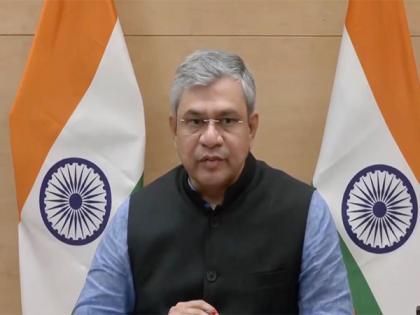India's AI strategy aims to democratise technology and boost jobs: Ashwini Vaishnaw
By ANI | Updated: August 9, 2025 10:44 IST2025-08-09T10:39:44+5:302025-08-09T10:44:50+5:30
New Delhi [India], August 9 : Union Minister for Electronics and Information Technology, Ashwini Vaishnaw, said that India's Artificial ...

India's AI strategy aims to democratise technology and boost jobs: Ashwini Vaishnaw
New Delhi [India], August 9 : Union Minister for Electronics and Information Technology, Ashwini Vaishnaw, said that India's Artificial Intelligence (AI) strategy is designed to democratise access to technology and create widespread economic and employment opportunities.
Vaishnaw said that the strategy, aligned with Prime Minister Narendra Modi's vision, builds on the country's rapidly growing technology sector. With annual revenues projected to exceed USD 280 billion and over six million people employed, India hosts more than 1,800 Global Capability Centres500 of them focusing on AI. The start-up ecosystem is also booming, with 89 per cent of last year's new startups powered by AI, he informed the Rajya Sabha.
India now ranks among the top countries in AI capabilities and is the second-largest contributor to AI projects on GitHub.
To institutionalise this momentum, the government launched the IndiaAI Mission in 2024. One of its key pillars is the development of accessible, high-quality datasets through AIKosh, a unified platform offering over 1,200 India-specific datasets and 217 AI models.
These datasetsranging from farmer queries to medical imagingare sourced from government departments, academia, and startups, with a strong focus on privacy and local relevance. A sandbox mechanism enables startups and academic researchers to test AI tools in a controlled environment.
The Bharat Data Exchange further supports AIKosh by providing structured access to government-owned data, while Digital India Bhashini, under the National Language Translation Mission, is developing AI-driven solutions in 22 Indian languages with contributions from over 70 institutions.
Other initiatives include the National Mission on Interdisciplinary Cyber-Physical Systems (NM-ICPS), which has established 25 innovation hubs, and the Indian Council of Medical Research's Health Data Repository, which hosts globally compliant clinical datasets.
Research programmes like IMPRINT, Uchhatar Avishkar Yojana, and Anusandhan National Research Foundation's AI-for-Science initiative are also advancing AI in science, education, and healthcare.
The Minister said that the outcome of these efforts is the development of high-quality, unbiased, and vernacular datasets that can be used for various AI applications, contributing to India's growth and development.
Disclaimer: This post has been auto-published from an agency feed without any modifications to the text and has not been reviewed by an editor
Open in app